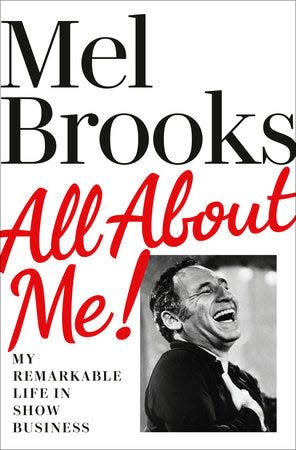Mel Brooks 'almost got into a fistfight' with Gene Wilder over iconic 'Young Frankenstein' scene
It took 95 years, but Mel Brooks has finally written his memoir.
"All About Me!: My Remarkable Life in Showbusiness" is an exuberant, at times emotional account of the comedy genius's life and career. It starts with his Brooklyn, New York, upbringing and stint in the army during World War II. He then details his early work as a writer on 1950s variety series "Your Show of Shows," where he met his best friend and collaborator of 70 years, Carl Reiner.
"I’ve worked with many great people in my life, but there will never be another Carl Reiner," Brooks writes of the comedian, who died last year at 98. "If you don’t have anyone in your life like Carl Reiner, stop reading this right now and go find someone!"

The book brims with zany showbiz anecdotes from Brooks' incomparable film work. For instance, studio execs requested that Brooks change "Springtime for Hitler," his satirical showstopper from 1967's "The Producers," to "Springtime for Mussolini." ("They thought Hitler was just too offensive," Brooks writes. "Mussolini was a much more acceptable dictator.")
Later, Brooks recalls how Orson Welles agreed to do the narration for 1981's "The History of the World, Part 1," but under the condition that he be paid $25,000 in cash. Asked what he planned to use it for, Welles told Brooks, "I am going to spend it all on fine Cuban cigars and the best Beluga caviar."
5 books not to miss: Mel Brooks memoir, disturbing ‘Sex Cult Nun’ and Brené Brown
Here are a few more of the most noteworthy takeaways from "All About Me!":

Mel Brooks was 'inconsolable' after losing wife Anne Bancroft
Brooks speaks affectionately about his "gorgeous," "talented" and "beautiful" second wife, "The Graduate" star Anne Bancroft, whom he met in 1961 and married three years later. The couple collaborated on films such as "Silent Movie" and "To Be or Not to Be," and the Oscar-winning actress was instrumental behind the scenes as well. In the book, Brooks recalls how she was the one who encouraged him to write "Springtime for Hitler" for "The Producers."

"You're musical. You're a good singer," Bancroft told him. "You never stop singing around the house! And besides, you're a born songwriter. No one else could write 'Springtime for Hitler' but you. So here's a pad and a pencil. Go into the next room, and I bet within an hour you'll come out with the beginning of a song."
Brooks credits her for always believing in him no matter what, calling her "a gift from God."
Bancroft died from uterine cancer in 2005 at 73. "For a long time, I was inconsolable," Brooks writes. "It was hard to wake up and live through the day." He thanks writer Thomas Meehan and director Susan Stroman for "pulling me out of my abyss of despair," helping him adapt "Young Frankenstein" for Broadway.
Gene Wilder 'almost got into a fistfight' with him over 'Young Frankenstein'
Brooks details his close friendship and creative partnership with Wilder, which started with "The Producers" and also included 1974's "Blazing Saddles" and "Young Frankenstein." The filmmaker says they only ever fought once in their careers and it was during the production of "Young Frankenstein." Wilder suggested that his reluctant mad scientist character, Dr. Frederick Frankenstein, perform a song-and-dance routine with Peter Boyle's The Monster.
"I thought it was a great idea and very funny, but it was too far out," Brooks says of the "Puttin' on the Ritz" number. "I insisted it was too silly and would tear the continuity of the movie to pieces. Gene disagreed. He said, “It’s amazing! It’s proof of how incredible Frankenstein’s creation is.
"We fought and we fought. Our tempers rose and we almost got into a fistfight over it. Then Gene calmed me down and he said, 'OK. Do me a favor. Film it and we’ll take a look at it. If it doesn’t work, I promise we’ll throw it out.' "
Brooks was pleasantly surprised after shooting the sequence and wholeheartedly agreed to keep it in, saying, "I have never been so wrong in my life."
Alfred Hitchcock became one of Brooks' 'good chums'
In 1977, Brooks wrote, directed and starred in "High Anxiety," a parody of Alfred Hitchcock thrillers featuring Madeline Kahn, Cloris Leachman and Harvey Korman (all regular players in Brooks' comedies).
While writing the screenplay, the filmmaker called Hitchcock's office to ask for his blessing and was shocked to learn that the Master of Suspense himself was a fan.
"Before I could say another word, (Hitchcock) cuts me off, 'Is this really Mel Brooks? I love your films. I loved 'Blazing Saddles.' It’s absolutely miraculously funny," Brooks recalls. After he explained his idea for the movie, Hitchcock invited Brooks over to his office for lunch, where he gave him notes on the script. It soon became a regular thing.
"Dutifully, I was there every Friday for pointers from the great Alfred Hitchcock ... as well as a free lunch!" Brooks says. "Over the weeks we became pretty good chums. He was just wonderful."
This article originally appeared on USA TODAY: Mel Brooks says 'there will never be another Carl Reiner' in new book

 Yahoo Movies
Yahoo Movies 
